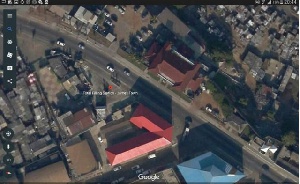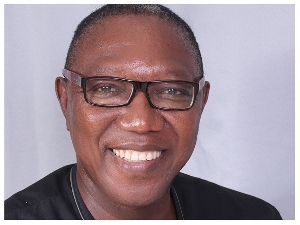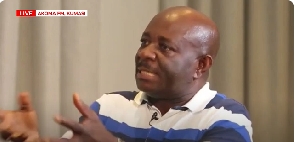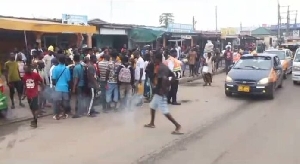 Total Filling Station in the middle of James Town
Total Filling Station in the middle of James Town
Many lives have been lost to gas explosions and wrong siting of filling stations. Dozens have been scarred for the rest of their lives and their only crime was to have been found close to a gas filling station either buying the product or just passing by.
I have watched from afar and with a broken heart, many of these, preventable, unpleasant events and I have been thinking about what I can do to salvage the situation. This is my proposal to solving this ticking 'time bombs' sited close to many houses. But before I do that, take a walk with me as I share this story my mother told me.
In the late 90s, there was this man named Salifu Amankwaah who worked as the head of the Kwame Nkrumah Circle Sanitation Task Force. The first time I heard his name was during the BBC Debate at Alisa Hotel during the June 3 Flood and Fire Disaster. What was so special about this man?" I asked my mother (when I got home). In her own words: "During this man's era, you dare not throw even a chewing stick anywhere near the Holy Gardens. Circle was so clean it became a place of relaxation with benches."
Sounds like Utopia to me; Circle was once Paradise? So I asked myself! "What happened and why did it change so much? What was Salifu Amankwaah doing that made his reign as a Task Force Head so memorable?"
Here's what I was told: "He had a no nonsense attitude and zero tolerance for anyone who tried to flout the sanitation rules at the Holy Gardens. Even though we were and still are a lawless lot, many Ghanaians feared the sanctions that came with breaking the rules, and Amankwaah was ruthless in applying the sanctions when the rules are broken. So nobody dared to disobey. Anyone who was caught littering or doing anything that was not in accordance with the rules of the place would be beaten and made to sweep the place the next day." I agree this was so drastic but it worked during that era and that's what kept the place cleaner and holier than it had ever been.
But why must we be beaten to do the right thing? The truth is most people do the right thing when they know someone is watching and will sanction them if they do the wrong thing. Beating is clearly unacceptable in our current dispensation where rights of criminals are just as important as the rights of saints.
What lessons can be drawn from the Salifu Amankwaah story? This means that it is highly possible that Circle, now referred to as ‘Ghana-Dubai’ could return to its once glorious state but not without our help. Not only did Salifu Amankwaah's work, keep the city clean, it also prevented certain disasters like flood that may have occurred as a result of choked gutters.
That's the reason for this particular article. We can use the Salifu Amankwaah theory to solve our gas disasters and the siting of our filling stations.
I have tried my best to assist with spot maps I have created from certain parts of the country where I believe have improperly sited filling stations (filling stations that are too close to settlements or too close to each other). According to the National Petroleum Authority, filling stations are supposed to be at least 30.8m or 100feet away from residential areas and 500m apart from each other. Some of these filling stations have restaurants and shops in and around them.
These laws notwithstanding, many of the filling stations sited are flagrant violations of the law. Some of these stations do have permits and how they got these permits is still something that beats my imagination. The NPA must use the Salifu Amankwaah high handed theory and shut down all illegally sited filling stations before they ‘shut’ the lives of innocent citizens.
I like to call this and subsequent articles - 'Chronicles' because I intend to cover each major city that has this problem. I believe this will help the NPA in identifying which of the filling stations are improperly sited (in case this has not already been done) and there would be no excuse not to monitor because their attention has been drawn to it.
Once these stations have been sighted, the regulators can better determine if they have been wrongly sited and when that is done, the law enforcement agencies must apply the law ruthlessly like Salifu Amankwaah did. I believe this will take care of who has rights to remain there and who would be required to leave for safety because as it stands now, there aren't any specific sanctions for people who flout these filling station regulations.
37 Area with the Golden Tulip Hotel sandwiched between two filling stations. There is another filling station opposite.
I would also like to draw our attention to certain practices that are dangerous and must be brought to an immediate halt if we indeed want to curb this menace. There is an advent of certain gas cylinders that have their burners directly on top which pose a serious threat; in case the gas leaks, there could easily be an explosion. Also, people who live near rubbish dumps (aside from the offensive smell) are faced with the risk of fire, because the waste from these dumping sites generates methane gas. Even though methane gas is not toxic, it is highly flammable.
Last but not least, filling stations with restaurants in and around them should be checked and if possible closed down because it only takes either a leak from their giant cooking cylinders or a leak from the filling stations and a spark of fire to explode.
If you live in any of these settlements that have been mentioned with fuel stations too close for comfort, you could try these things:
1. Boycott patronage of shops that are improperly sited alongside filling stations.
2. Demonstrate on the basis of a health hazard complaint till something is eventually done about it. I believe in the power of the people because it is the power of the people that has been vested in these authorities. Therefore, if these authorities are not using the power that was given to them to protect us, we have to make it work because we stay silent at our own risk.
3. If the area was originally mapped out as a filling station or industrial area, we owe it to ourselves to do the right thing and evacuate in case it turns out that we do not have the permission to live there.
Also, if your settlement has not been mentioned, you can contact me via email, Facebook or Twitter using my contact details at the end of this article. Send me a picture of a filling station that you think is a time bomb (it may or may not be around you). I believe this is a useful exercise to map out danger zones and provide a way forward to this engineering problem because it looks like even if there would ever be a restructuring of our cities, it will take a while; in the meantime we can't afford to wait at the mercy of these time bombs and fold our arms.












